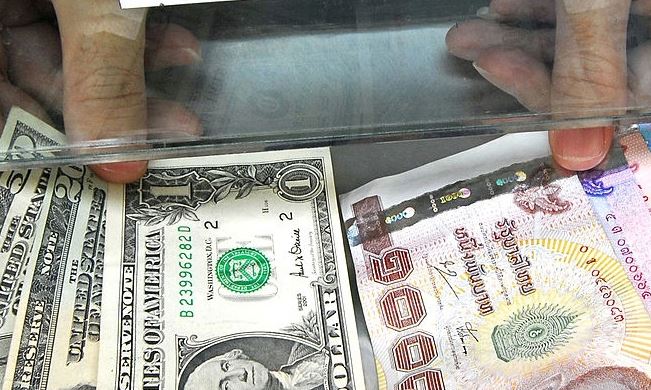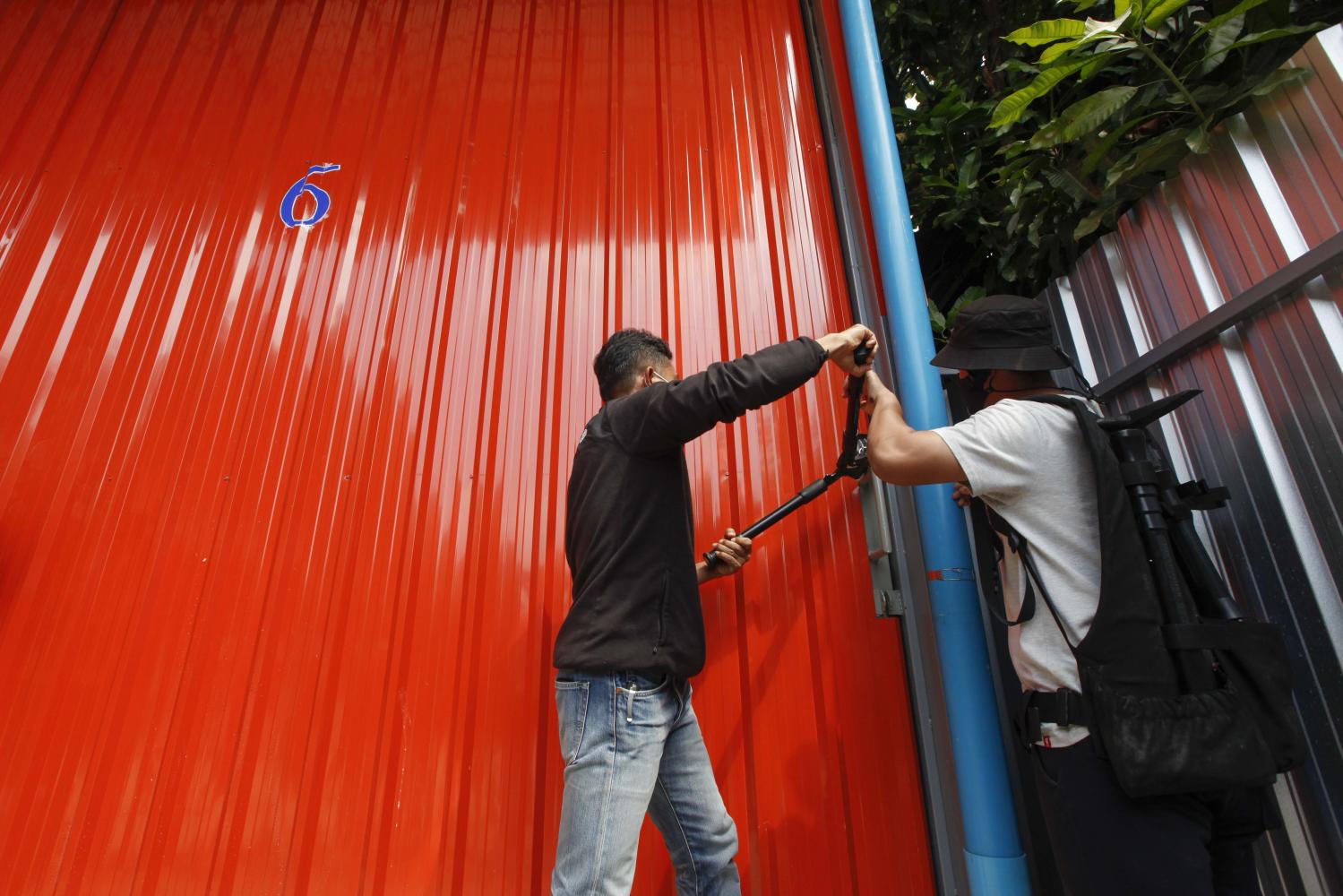USD to Thai Baht today and long-term forecast

Dollar To Baht Forecast For 2021, 2022, 2023, 2024 & 2025
| Month | Open | Low-High | Close | Mo,% | Total% |
| 2021 | |||||
| Jan | 29.99 | 29.54-30.44 | 29.99 | 0.0% | 0.0% |
| Feb | 29.99 | 29.56-30.46 | 30.01 | 0.1% | 0.1% |
| Mar | 30.01 | 29.29-30.19 | 29.74 | -0.9% | -0.8% |
| Apr | 29.74 | 28.47-29.74 | 28.90 | -2.8% | -3.6% |
| May | 28.90 | 28.06-28.92 | 28.49 | -1.4% | -5.0% |
| Jun | 28.49 | 28.49-29.42 | 28.99 | 1.8% | -3.3% |
| Jul | 28.99 | 28.38-29.24 | 28.81 | -0.6% | -3.9% |
| Aug | 28.81 | 28.70-29.58 | 29.14 | 1.1% | -2.8% |
| Sep | 29.14 | 27.85-29.14 | 28.27 | -3.0% | -5.7% |
| Oct | 28.27 | 27.32-28.27 | 27.74 | -1.9% | -7.5% |
| Nov | 27.74 | 27.20-28.02 | 27.61 | -0.5% | -7.9% |
| Dec | 27.61 | 27.61-28.87 | 28.44 | 3.0% | -5.2% |
| 2022 | |||||
| Jan | 28.44 | 28.30-29.16 | 28.73 | 1.0% | -4.2% |
| Feb | 28.73 | 28.73-30.03 | 29.59 | 3.0% | -1.3% |
| Mar | 29.59 | 28.73-29.61 | 29.17 | -1.4% | -2.7% |
| Apr | 29.17 | 28.75-29.63 | 29.19 | 0.1% | -2.7% |
| May | 29.19 | 28.36-29.22 | 28.79 | -1.4% | -4.0% |
| Jun | 28.79 | 28.35-29.21 | 28.78 | 0.0% | -4.0% |
| Jul | 28.78 | 28.09-28.95 | 28.52 | -0.9% | -4.9% |
| Aug | 28.52 | 28.30-29.16 | 28.73 | 0.7% | -4.2% |
| Sep | 28.73 | 27.53-28.73 | 27.95 | -2.7% | -6.8% |
| Oct | 27.95 | 27.22-28.04 | 27.63 | -1.1% | -7.9% |
| Nov | 27.63 | 27.37-28.21 | 27.79 | 0.6% | -7.3% |
| Dec | 27.79 | 27.48-28.32 | 27.90 | 0.4% | -7.0% |
| 2023 | |||||
| Jan | 27.90 | 27.79-28.63 | 28.21 | 1.1% | -5.9% |
| Feb | 28.21 | 26.95-28.21 | 27.36 | -3.0% | -8.8% |
| Mar | 27.36 | 26.82-27.64 | 27.23 | -0.5% | -9.2% |
| Apr | 27.23 | 27.23-28.32 | 27.90 | 2.5% | -7.0% |
| May | 27.90 | 27.12-27.94 | 27.53 | -1.3% | -8.2% |
| Jun | 27.53 | 26.77-27.59 | 27.18 | -1.3% | -9.4% |
| Jul | 27.18 | 26.89-27.71 | 27.30 | 0.4% | -9.0% |
| Aug | 27.30 | 27.30-28.54 | 28.12 | 3.0% | -6.2% |
| Sep | 28.12 | 28.12-29.01 | 28.58 | 1.6% | -4.7% |
| Oct | 28.58 | 28.49-29.35 | 28.92 | 1.2% | -3.6% |
| Nov | 28.92 | 28.21-29.07 | 28.64 | -1.0% | -4.5% |
| Dec | 28.64 | 28.34-29.20 | 28.77 | 0.5% | -4.1% |
| 2024 | |||||
| Jan | 28.77 | 27.49-28.77 | 27.91 | -3.0% | -6.9% |
| Feb | 27.91 | 27.40-28.24 | 27.82 | -0.3% | -7.2% |
| Mar | 27.82 | 26.92-27.82 | 27.33 | -1.8% | -8.9% |
| Apr | 27.33 | 26.84-27.66 | 27.25 | -0.3% | -9.1% |
| May | 27.25 | 26.96-27.78 | 27.37 | 0.4% | -8.7% |
| Jun | 27.37 | 26.87-27.69 | 27.28 | -0.3% | -9.0% |
| Jul | 27.28 | 26.37-27.28 | 26.77 | -1.9% | -10.7% |
| Aug | 26.77 | 26.28-27.08 | 26.68 | -0.3% | -11.0% |
| Sep | 26.68 | 25.87-26.68 | 26.26 | -1.6% | -12.4% |
| Oct | 26.26 | 26.05-26.85 | 26.45 | 0.7% | -11.8% |
| Nov | 26.45 | 25.61-26.45 | 26.00 | -1.7% | -13.3% |
| Dec | 26.00 | 25.49-26.27 | 25.88 | -0.5% | -13.7% |
| 2025 | |||||
| Jan | 25.88 | 24.95-25.88 | 25.33 | -2.1% | -15.5% |
| Feb | 25.33 | 25.06-25.82 | 25.44 | 0.4% | -15.2% |
USD to THB forecast for January 2021.
In the beginning rate at 29.99 Bahts. High exchange rate 30.44, low 29.54. The average for the month 29.99. The USD to THB forecast at the end of the month 29.99, change for January 0.0%.
Dollar to Baht forecast for February 2021.
In the beginning rate at 29.99 Bahts. High exchange rate 30.46, low 29.56. The average for the month 30.01. The USD to THB forecast at the end of the month 30.01, change for February 0.1%.
USD to THB forecast for March 2021.
In the beginning rate at 30.01 Bahts. High exchange rate 30.19, low 29.29. The average for the month 29.81. The USD to THB forecast at the end of the month 29.74, change for March -0.9%.
Dollar to Baht forecast for April 2021.
In the beginning rate at 29.74 Bahts. High exchange rate 29.74, low 28.47. The average for the month 29.21. The USD to THB forecast at the end of the month 28.90, change for April -2.8%.
USD to THB forecast for May 2021.
In the beginning rate at 28.90 Bahts. High exchange rate 28.92, low 28.06. The average for the month 28.59. The USD to THB forecast at the end of the month 28.49, change for May -1.4%.
USD To THB Forecast For Tomorrow And Month.
AUD To THB Forecast For Tomorrow, Month, 2021, 2022.
Dollar to Baht forecast for June 2021.
In the beginning rate at 28.49 Bahts. High exchange rate 29.42, low 28.49. The average for the month 28.85. The USD to THB forecast at the end of the month 28.99, change for June 1.8%.
USD to THB forecast for July 2021.
In the beginning rate at 28.99 Bahts. High exchange rate 29.24, low 28.38. The average for the month 28.86. The USD to THB forecast at the end of the month 28.81, change for July -0.6%.
Dollar to Baht forecast for August 2021.
In the beginning rate at 28.81 Bahts. High exchange rate 29.58, low 28.70. The average for the month 29.06. The USD to THB forecast at the end of the month 29.14, change for August 1.1%.
USD to THB forecast for September 2021.
In the beginning rate at 29.14 Bahts. High exchange rate 29.14, low 27.85. The average for the month 28.60. The USD to THB forecast at the end of the month 28.27, change for September -3.0%.
Dollar to Baht forecast for October 2021.
In the beginning rate at 28.27 Bahts. High exchange rate 28.27, low 27.32. The average for the month 27.90. The USD to THB forecast at the end of the month 27.74, change for October -1.9%.
USD to THB forecast for November 2021.
In the beginning rate at 27.74 Bahts. High exchange rate 28.02, low 27.20. The average for the month 27.64. The USD to THB forecast at the end of the month 27.61, change for November -0.5%.
Dollar to Baht forecast for December 2021.
In the beginning rate at 27.61 Bahts. High exchange rate 28.87, low 27.61. The average for the month 28.13. The USD to THB forecast at the end of the month 28.44, change for December 3.0%.
USD to THB forecast for January 2022.
In the beginning rate at 28.44 Bahts. High exchange rate 29.16, low 28.30. The average for the month 28.66. The USD to THB forecast at the end of the month 28.73, change for January 1.0%.
Dollar to Baht forecast for February 2023.
In the beginning rate at 28.21 Bahts. High exchange rate 28.21, low 26.95. The average for the month 27.68. The USD to THB forecast at the end of the month 27.36, change for February -3.0%.



.jpg.ca6d298eb38f5249f95772b8eab518e2.jpg)















